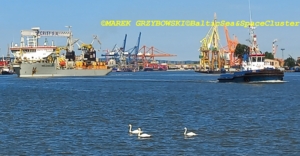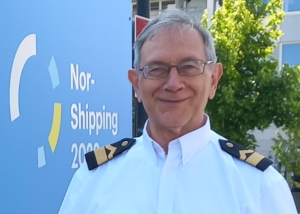EUR 2 billion for the green transformation of maritime transport in the EU

 By Marek Grzybowski
By Marek Grzybowski
CLIA Europe, ECSA, ESPO, FEPORT, SEA Europe and WaterborneTP organized an EU information day on the Innovation Fund for the Water Transport Sector in Brussels. The meeting was attended by approximately 300 participants from the water transport sector. There were representatives of business and administration who are interested in implementing zero-emission transport with the support of EU funds.
The innovation fund uses revenues raised by the EU Emissions Trading Scheme. These funds are to be allocated to the green transformation of Europe. Under the new EU ETS directive, 20 million allowances have been allocated to the maritime transport sector. This is a pool separated from the EU Emissions Trading System (ETS). These allowances represent an amount of between EUR 1.5 and 2 billion, taking current fees into account.
The release notes that “water transport projects were already eligible for financing” in the past. However, the latest call for proposals under the EU Innovation Fund takes into account the specificities of the sector. The fact that maritime transport pays fees to the EU ETS from January 1, 2024 is taken into account.
The crisis situation in the Red Sea may verify these estimates. It can be assumed that these amounts will be higher if the longer route of ships traveling from Asia to Europe around Africa is taken into account. This route is one third longer than the Suez Canal. After Russia attacked Ukraine, the tendency to use the Northern Shipping Route was limited.
EU Innovation Fund for ships
A statement after the meeting stipulates that “The Innovation Fund will focus on highly innovative technologies and flagship projects in Europe that can achieve significant emission reductions.” The purpose of financing is to spread the risk of project implementation among many innovators. Preference will be given to “highly innovative projects with clear added value” for the European economy.
In the area of water transport, support can be provided to many clean technologies that contribute to the decarbonization of the sector. Preference will be given to actions that will improve energy efficiency and introduce ecological fuels and energy sources. Financing plans also include infrastructure. During the information day, potential stakeholders presented examples of new projects supporting the development of zero-emission transport.
According to the meeting organizers, “there is still a need to further adapt the fund to future calls and upcoming special competitions for maritime industries. The idea is to take into account the specificity of the sector.
– The event was a unique opportunity to also discuss these issues, ranging from methods of calculating and assessing contract award criteria, which must be adapted to the specificity of the sector, to the need to ensure access to financing instruments for small and medium-sized enterprises and the importance of creating a comprehensive network – emphasizes in message.
Maritime cluster on an innovation course
Marie-Caroline Laurent, CLIA CEO for Europe, said: “The cruise industry is at the heart of the European maritime industry cluster, with 98% of cruise ships built in Europe. The ability to access the EU Innovation Fund will support our industry’s drive to innovate.”
In her opinion, to achieve the maritime industry’s goal of zero greenhouse gas emissions by 2050, investing EU ETS revenues in maritime innovation, research and development and appropriate renewable energy infrastructure in ports will be essential at European and national level.
– Decarbonizing shipping is not a matter of “if”, but a matter of “how”, emphasizes Sotiris Raptis, Secretary General of ECSA. So, the allocation of almost €2 billion of ETS revenues to the maritime sector is a victory for the decarbonization of the sector.
Raptis notes that “green fuels can be up to five times more expensive than currently used fuels.” Therefore, financial support under the Innovation Fund is crucial to filling the price gap, as well as improving the energy efficiency of ships, supporting innovation and building infrastructure in ports – notes the Secretary General of ECSA.
– The EU Innovation Fund plays a fundamental role in paving the way for the fastest possible progress on the path towards turning the sector green, said Isabelle Ryckbost, Secretary General of ESPO. In her view, “This requires important and high-risk investments in ports to ensure the supplies and infrastructure necessary to harness new energies and technologies.”
Ports are developing new technologies
According to Ryckbost, “The Fund should support projects that are exceptionally effective in reducing emissions and overall climate impact and that need to be improved and further developed through further innovation.”
– This type of meeting is a very important undertaking that allows us to identify the main needs that should be taken into account in the upcoming competitions – noted Lamia Kerdjoudj, Secretary General of FEPORT.
In her opinion, “the meeting confirmed how important it is to allocate part of the Innovation Fund’s income to the maritime and port sectors.” FEPORT also highlights the need to focus on greenhouse gas avoidance, cost efficiency and repeatability as important award criteria to ensure that the innovation fund can adequately support energy efficiency, Kerdjoudj emphasizes.
Cruise Lines International Association (CLIA) is the world’s largest trade association for cruise operators. The organization supports policies and practices that promote safe, healthy and sustainable operations of tour operators and cruise ship owners. The organization promotes positive solutions in organizing travel for over 30 million passengers using sea cruises annually.
ECSA represents 21 national shipowners’ associations headquartered in the EU and Norway. European shipowners control 39.5% of the world’s merchant fleet. Operators contribute EUR 149 billion annually to the EU’s GDP and support almost 2 million people who work both on ships and on land – emphasizes ECSA. The company emphasizes that it “seeks to create a regulatory environment conducive to improving the competitiveness of European shipping, to the benefit of the EU.”
ESPO represents seaport authorities, port associations and port administrations of European Union seaports. ESPO also has observer members from Albania, Iceland and Israel. Montenegro, Ukraine and Great Britain also have their representatives.
FEPORT d 1993 represents the interests of many different private port and terminal companies providing services related to cargo handling in terminals and activities related to logistics in European Union seaports. FEPORT members employ over 390,000. port workers.
SEA Europe represents the European shipbuilding industry in 15 countries, covering the production, maintenance, repair, modernization and conversion of all types of ships and floating structures. The organization brings together companies that operate in virtually all links of the supply chain ensuring the production of marine systems, equipment and services related to the use of marine technology.
WATERBORNE TP was established as an industry-focused technology platform to establish knowledge and technology transfer between water transport stakeholders. The organization brings together, among others, classification societies, shipyards, shipowners, ship equipment and marine equipment manufacturers. The organization’s members also include infrastructure and service providers, universities and research institutes, as well as EU institutions. Waterborne TP members include entities from the maritime sector and organizations operating in the field of inland navigation.
